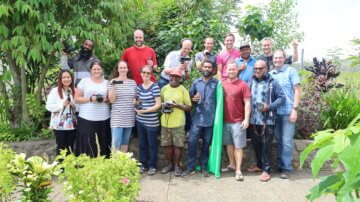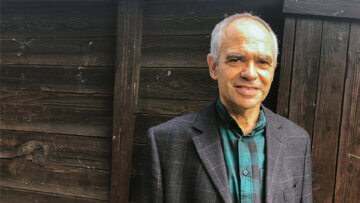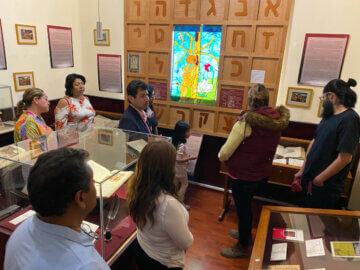A Bowl of Soup and a Step of Faith
Story to encourage and strengthen – Wycliffe World Day of Prayer 2021
Lupe Lui is a Tongan who serves with Papua New Guinea Bible Translation Association.
In October 2020 we were preparing to go to Popondetta in Oro Province to open a new office of Papua New Guinea Bible Translation Association (BTA). I was given the opportunity to go with the team and brought K300 (300 Kina) as pocket money for personal use. BTA gave me some cash to buy decorations and candy to make candy leis for the opening. At the checkout I realized that the cost of the items was much more than the cash in hand from BTA. A thought came to mind that this was an opportunity to be a blessing to the languages in Oro, and so I took some of my personal cash to pay off the balance.
That evening, my Tongan sister living in Papua New Guinea (PNG) asked if I could help bake some cakes for her ministry with widows. She said she would bring the ingredients. Then I thought, ’This is another opportunity to serve these PNG widows.’ I told her not to worry, that I would buy the ingredients. The next evening I stayed up all night to bake 12 chocolate cakes and felt very privileged to bake for these widows. I checked my cash and had K68 left from the original K300.
On Wednesday evening I planned to visit one of our managers who had been sick and had not eaten for days. He vomited everything he ate and became very weak. He is an older person and many of us look to him as ’Papa’. I told his wife to tell him I was coming to visit him and would buy something for him to eat. His wife, Elizabeth, discouraged me saying, “Lupe, he won't eat it, don’t waste money, just come and see him.” I told her that in my Tongan culture, I cannot visit someone and come empty handed. I must bring something to give as a gift. I asked her to come with me to the Korean restaurant. I ordered fish soup with seaweed and green leafy vegetables.
Again, Aunty Elizabeth told me that he would not eat it. I assured her that Papa would eat this soup. I went to pay for the soup and the amount was K68. So I took out my last K68 and paid for it. Aunty Elizabeth said this was a very expensive soup. I told her Papa is worth more than K68, and if he doesn’t eat it, she can have it.
On our way back home, Aunty Elizabeth was chatting with another staff member in the vehicle. I took that opportunity to lay hands on the bowl of soup and prayed in Tongan so that no one would understand what I was praying.
I prayed: “Father, you know that Papa Steven is really sick and not eating. I am asking you a favour. Please make him eat. I know it is not time for him to die. He still has a lot to do. Please heal him. Father, I spent my last K68 and I want it to be used, please hear my prayer. I, a Tongan missionary, am asking on behalf of a Papua New Guinean missionary. Amen.”
Back at the BTA centre, I left the food with Aunty Elizabeth to give to ‘Papa’. I told my flatmate that I would have to raise some funds to take with me to Oro Province. She was unhappy with me because I used up the money set aside for the trip. I just laughed and began thinking about ideas for raising funds. But then I thought, I will go empty handed because God will provide. My thoughts were interrupted with a text message from Papa Steven. He sent the message to say thank you and that the food was very yummy. I did not believe what I was hearing because sometimes people say good things to not hurt my feelings. I wanted to hear directly from Aunty Elizabeth.
The next morning as I was preparing to go to work, a text message came from a Papua New Guinean friend saying, “I don’t know why God put you in my heart but he did and I just transferred K300 into your account. Please check your account.” I was shocked, but happy to hear this message.
I sought out Aunty Elizabeth in the office. I wanted to hear from her personally that what Papa Steven said was true. She was so excited—jumping up and down, hugging me and saying ‘thank you!’ She told me that Papa ate everything. My heart was filled with gratitude that God heard my prayers. From that night, Papa Steven started eating and began to gain strength. He recovered and went back to work.
Our God answers prayer and provides for our needs when we put our faith in him. Lupe stepped out in faith and generosity. As a result, her faith was strengthened and others’ faith as well!
Click to return to:
The latest
View all articles
03/2024 Pacific: Papua New Guinea
Informing, teaching, inspiring: PNG workshop teaches video storytelling for language communities
PNG workshop teaches video storytelling for language communities
Read more
02/2024 Global
Looking ahead at 2024
As the year unfolds, we marvel at the work of God in our rapidly changing world. And, we look forward to a number of gatherings and conversations intended to draw us together.
Read more
01/2024 Americas
Telling the Bible's Story
It may come as a surprise that a museum is among the Wycliffe Global Alliance organisations.
Read more